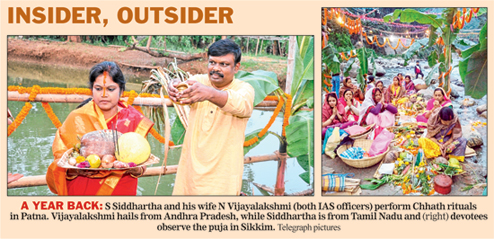Bihar's festival of Chhath is no longer limited to the state's boundaries, thanks largely to people from the state moving out and taking a bit of Bihar along with them.
What was earlier confined to Bihar and Biharis is now being performed across the country and even overseas with utmost devotion. The devotees are not always Bihari.
People like N. Vijayalakshmi, an IAS officer hailing from Andhra Pradesh, feels proud about observing Chhath in Patna.
Thanks to large-scale migration, many Bihari families settled elsewhere in the country observe this festival. For instance, most Bihari families settled in Bangalore perform Chhath on the water tanks atop their house. People in Pimpri-Chinchwad Mahanagarpalika in Pune perform the rituals on the banks of ponds in their vicinity. In Delhi, countless Biharis mark the rituals on the banks of the Yamuna and in Sikkim, it is observed on lakes. Many do it out of devotion for the Sun God, the only pratyaksh devta or visible God, while others do it for health benefits that accrue from four days of fasting and other rituals.
A mix of health benefits and religious values took Vijayalakshmi to Chhath. "Sun is the source of all energies," Vijayalakshmi told The Telegraph. She further said: "It is also believed that life emanates from the Sun. That apart, Chhath has numerous health and spiritual benefits. Fasting for four days detoxifies the body while standing waist-deep in water balances hormonal secretions and cures fungal and bacterial infections."
The 1995-batch Bihar cadre IAS officer, a commissioner in the state rural development department, observes Chhath at a pond in her Bailey Road government bungalow. Her husband, S. Siddhartha, secretary in the information technology and labour resources department, accompanies her during the rituals.
Pravin Nair, a senior research director at Mumbai-based Hansa Research, hails from Kerala but observes Chhath at Mumbai's Juhu beach or Chowpatty, in solidarity with his wife Prabha, who is from Patna. "Most of the time, we go to the beach to perform the rituals with friends and neighbours. Otherwise, we carry it out at our home in Kandivali, the western suburb. Even our neighbours, some of them Marathis and south Indians, participate in the rituals," said Pravin.
Despite some derogatory remarks against Biharis by Maharashtra Navnirman Sena chief Raj Thackeray in 2008, around 3-5 lakh devotees have been performing Chhath for over a decade now in Mumbai.
Nearer home, the Mamata Banerjee government in Bengal declared section holidays for Chhath in 2012. Even this year, November 17 (Tuesday), is a section holiday for the state government officials in Bengal.
Packed, special Bihar-bound trains from a few days before Chhath testify to the extreme devotion people have for this festival. "Chhath has become the symbol of Bihari Asmita. Wherever they stay, this festival is celebrated with austerity. Now, there is a huge gathering even on Mumbai's beach. The Sun apart, even mother goddess is worshipped. Chhathi maiya is none other than Skanda-mata or Parvati. The festival is unique in that Sun worship is blended with worship of Chhathi maiya or Parvati. Hence, it should be celebrated across the country," said Acharya Kishore Kunal, chairman of Bihar State Religious Trusts Board.
In the words of D.M. Diwakar, a professor of economics at Patna-based AN Sinha Institute of Social Studies, the empire of Chhath started expanding from Varanasi and several bordering towns in eastern Uttar Pradesh in the early 90s and today it is performed across the country and even abroad.
"From Gomti river in Uttar Pradesh and Shipra river in Madhya Pradesh to the western and eastern coastal line down south, Chhath has gradually emerged as a sub-cultural resurgence. Many non-Biharis increasingly associate themselves with it. This is because Chhath is not bound by caste, creed or religion. In Bihar, one can find many Muslims performing Chhath. It does not involve any idol-worship and all devotees pray to the Sun God and other elements of Mother Nature," said Diwakar.
One reason for Chhath's growing popularity around the country has been its observance by Biharis settled elsewhere. "When I perform Chhath on our rooftop, people from all 16 flats, hailing from various states, participate. Normally, most of them don't get up before 7am but on the day of morning arghya, they get up as early as 4am, take a bath and join us for the rituals. It gives us a feeling of pride and we openly involve everyone in observing the festival," said Kiran Rai, a native of Patna, who is now settled at Martha Halli vicinity in Bangalore.











